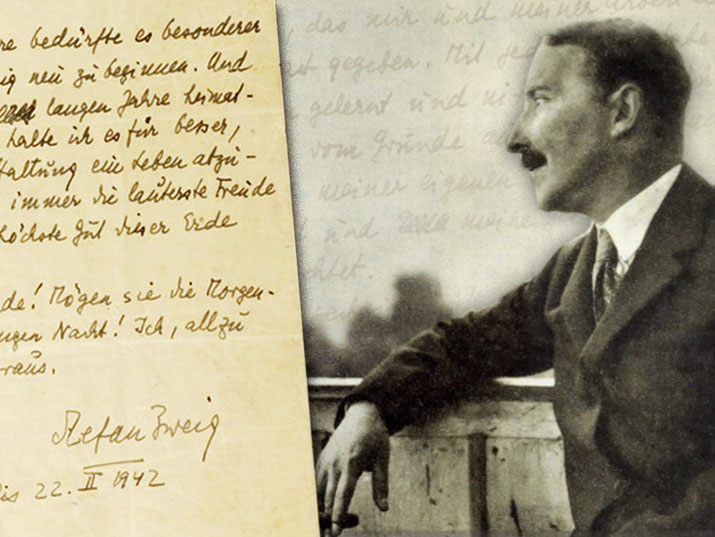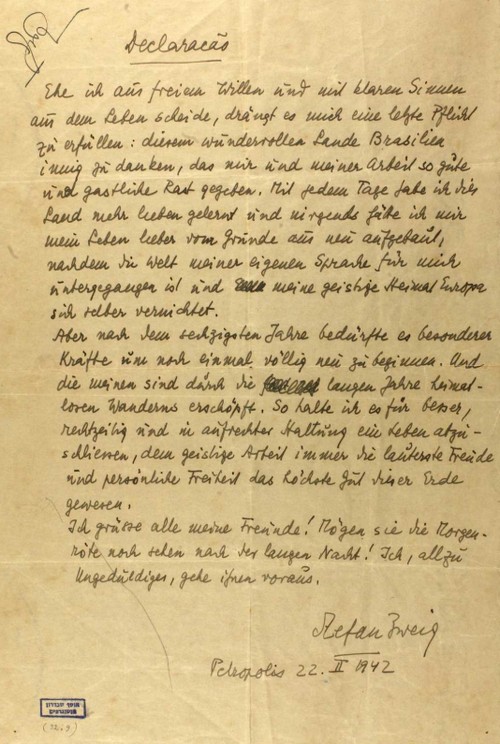Home > Austrian Jewry > “My spiritual home destroyed itself”: Stefan Zweig’s Suicide Note
“My spiritual home destroyed itself”: Stefan Zweig’s Suicide Note
The letter with which Stefan Zweig took leave of the world is preserved today in the archives of the National Library of Israel
The National Library of Israel | 20.02.22
Austrian JewryLife Before The HolocaustStefan ZweigThe HolocaustVienna

Stefan Zweig was born in Vienna in 1881 to a well-to-do Jewish family. As the younger son, Zweig was exempt from the obligation to pursue a traditional, breadwinning profession and, instead, dedicated himself to the art of writing. He wrote poems, novellas, historical biographies, novels, and essays. Zweig traveled extensively throughout Europe and his books were sold in many languages with great success.
His most well-known work, The World of Yesterday, discusses the rise of German populism and the long-term tenure of Vienna’s antisemitic mayor, Karl Lueger. As someone who had experienced these developments first-hand, Zweig understood that this “new,” venomous iteration of politics had paved the way for the rise of the Nazis. He realized that the xenophobia and antisemitic rage that characterized this particular political movement would be exploited and perfected later by the head of the party, Adolf Hitler.
With the ascension of the Nazis to power in Germany in 1933, Zweig found himself gradually pushed out of the German-speaking world. In 1938, with the annexation of Austria by Nazi Germany, Zweig moved to England. Upon the outbreak of World War II, he traveled to the United States and visited South America. In 1941 Zweig immigrated to Brazil with his second wife, Charlotte Elizabeth (‘Lotte’).
Zweig viewed Brazil as a land of hope with a bright future. He believed that there was a chance that the values he cherished could flourish there: the unity of the human race, peace, brotherhood among men, and equality among different races. However, as the Nazis advanced their conquest and the war spread to the Atlantic, the ramifications were felt even in South America. Zweig himself felt ever more isolated and grew aware that the European world he knew and loved was lost forever.
On February 22nd 1942, Zweig and his wife, Lotte, were found dead in each other’s arms. The couple committed suicide by taking a lethal dose of pills. Zweig passed first, with Lotte following.
This is the suicide letter Zweig left behind:

The suicide note, which is kept at the National Library
Before parting from life of my own free will and in my right mind I am impelled to fulfill a last obligation: to give heartfelt thanks to this wonderful land of Brazil which afforded me and my work such kind and hospitable repose. My love for the country increased from day to day, and nowhere else would I have preferred to build up a new existence, the world of my own language having disappeared for me and my spiritual home, Europe, having destroyed itself.
But after one’s sixtieth year unusual powers are needed in order to make another wholly new beginning. Those that I possess have been exhausted by long years of homeless wandering. So I think it better to conclude in good time and in erect bearing a life in which intellectual labour meant the purest joy and personal freedom the highest good on earth.
I salute all my friends! May it be granted them to see the dawn after the long night! I, all too impatient, go on before.
Stefan Zweig
Petrópolis 22/2/1942
If you liked this article, try these:
“If Judaism is a tragedy, let us live it” – Stefan Zweig’s Letters Revealed
All that Remains of “The Great Unknown”
“Now I think that Kafka himself is saying to me: ‘You have done enough’”
Before parting from life of my own free will and in my right mind I am impelled to fulfill a last obligation: to give heartfelt thanks to this wonderful land of Brazil which afforded me and my work such kind and hospitable repose. My love for the country increased from day to day, and nowhere else would I have preferred to build up a new existence, the world of my own language having disappeared for me and my spiritual home, Europe, having destroyed itself.
But after one’s sixtieth year unusual powers are needed in order to make another wholly new beginning. Those that I possess have been exhausted by long years of homeless wandering. So I think it better to conclude in good time and in erect bearing a life in which intellectual labour meant the purest joy and personal freedom the highest good on earth.
I salute all my friends! May it be granted them to see the dawn after the long night! I, all too impatient, go on before.
Stefan Zweig
Petrópolis 22/2/1942
If you liked this article, try these:
“If Judaism is a tragedy, let us live it” – Stefan Zweig’s Letters Revealed
All that Remains of “The Great Unknown”
“Now I think that Kafka himself is saying to me: ‘You have done enough’”
4 comments
==
Larry Glinzman-Murphy
Suicide for nothing. 3 years later. all of Western Europe was freed from the Nazis.
Like · Reply · 2 · 5y
Emilio Lolli
I don't agree with you: the world where he was born had really disappeared, 6 million Jews had been killed and their presence and heritage in Europe (first of all, the Yiddish language) almost entirely destroyed. Post-1945 Europe won't be before-1939 Europe any more.
Like · Reply · 9 · 3y
Debby Toomey Stander
If you haven't read his book, "The World of Yesterday," I highly recommend it. His description of how, from the ebulliance of European life and culture entering the 20th century, the continent descended into the chaos of World War I is eye opening and the parallels between what many of us in the west are experiencing today in our countries is impossible to ignore. I'm still reading it -- am right now in the period between WW I and WW II. It is fascinating as a first-hand account and will really reward the reader with the window it opens onto history.
Like · Reply · 4 · 2y
Ralph Saultz
Thak you Debbie for the recomendation. I however am ambivalent about reading it, as in TrumpMerica 2025+ I shall likely be even more cynical about history repeating itself. The only hope is that just as in Nazi Germany, it will be but 4 years for my lumpenproletarian brethren to about- face on this dastardly man and his destructive anti-democratic policies.
Like · Reply · 28w
Dorothy Ogden
I always thought him as a I I writerwriter of romantic books. I always wanted to read his novel, "Letter from an Unknown Woman."
Like · Reply · 2y
Dorothy Ogden
I did read a psychological drama about a woman who leaves her husband for another man written by S. Zweig, I forgot the title.
Like · Reply · 2y
Facebook Comments Plugin
